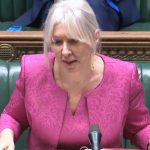Nearly 4,000 people were believed to have been sleeping rough in England on a single night last autumn – a 27% increase from the year before.
Charities say it is the largest annual increase since 2015 – and more than double the estimates from 2010 when records first began.
Government figures also show a record 109,000 households were in temporary accommodation from July to September 2023, including more than 142,490 children.
Quarterly figures suggest 78,460 households are facing homelessness.
Politics latest: Policing of Sarah Everard vigil was ‘awful’, home sec says
Please use Chrome browser for a more accessible video player
Housing charity Shelter said the numbers showed the government was “failing to get a grip on the housing emergency and has failed its 2019 manifesto commitment to end rough sleeping by 2024”.
Fiona Colley, director of social change at Homeless Link, said the “appalling” spike in rough sleeping “points to a situation that is out of control and demands emergency action”.
Homeless rise sees young person become destitute every four minutes, research finds
Clearing asylum backlog ‘created another crisis’ as refugees left homeless, charities say
From three-bed house last Christmas to homelessness this year – the family of four whose story is becoming all too familiar
She warned: “Sleeping rough is a deeply traumatic experience that severely impacts people’s mental and physical health. If a healthy society is judged by how it supports its most vulnerable citizens, then today’s statistics are truly shameful.”
The figures come after more than 100 council leaders wrote to Housing Secretary Michael Gove – asking him to heed campaigners’ calls for eviction notice periods to be extended to four months to stop renters from sliding into homelessness.
Of the 35,760 households who were assessed as being threatened with homelessness, 6,580 households were in this position due to being served a Section 21 notice to end a private rented tenancy – something the government promised to outlaw in 2019.
Please use Chrome browser for a more accessible video player
Tom Darling, campaign manager at the Renters’ Reform Coalition, said the statistics revealed that almost 90,000 people had claimed statutory homelessness support after receiving a Section 21 notice.
There are fears that protections for renters could be watered down by the government in an attempt to appease Tory backbenchers who are hesitant over the changes.
A DHLUC spokesperson said: “We want everyone to have a safe place to call home, which is why we’re giving councils £1.2bn so that they can give financial support to those who need it, helping them to find a new home and move out of temporary accommodation.
“Temporary accommodation is a vital safety net to make sure families are not left without a roof over their heads, but councils must make sure it is suitable for families.
“At the same time, we have boosted the local authority housing allowance, making the 1.6 million private renters in receipt of housing benefit or universal credit nearly £800 a year better off.”






















